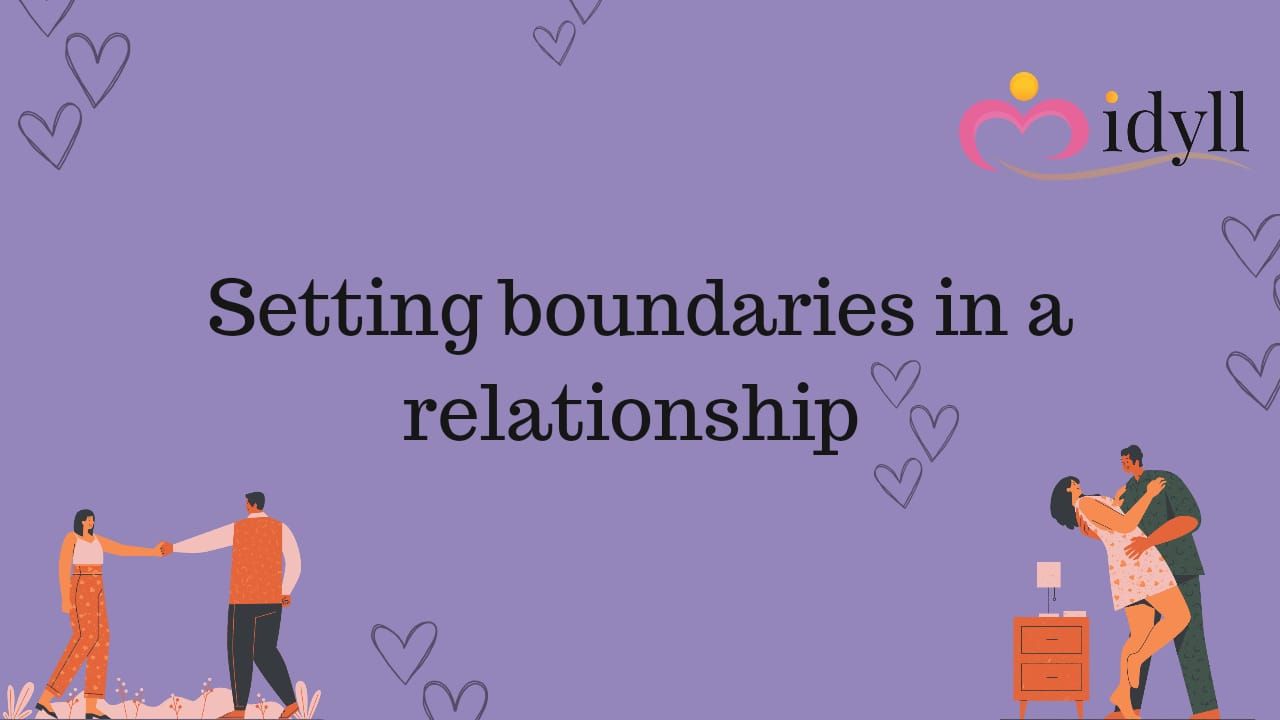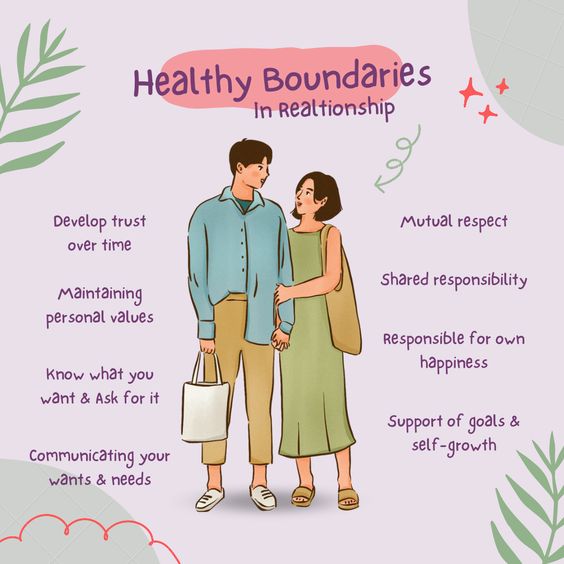How do I set boundaries in a relationship?

Log ghar ki deeware or rishto ki diwaare bht pyaar se banate hai. Lekin bhul jaate hai ki ghar ho ya rishta, hota to hamesha ek plant jaisa hai, jisme samay ke saath saath sab dena hai padta hai! Jaise ghar ki diwaare hai, waise hi rishto me bhi boundaries lgani pdti hai. Setting healthy boundaries is really important!
Are you tired of feeling overwhelmed and suffocated in your relationship? Join us as we explore the essential steps to setting healthy boundaries that nurture love and respect.
Being in good company is based on affection, confidence, and sympathy. These three pillars serve as the foundation for building the strongest and longest-lasting connections of all. That feeling of love warms your whole chest when you think about someone you love, growing over time to nurture and care for something you treasure.
Trust is what holds everything together. It’s the idea that he is trustworthy and has your back. Trust is developed based on honesty, integrity, and believing that our weaknesses will not be taken advantage of.
Your happiness matters! Discover how setting healthy boundaries can contribute to your personal growth and strengthen the bond you share with your partner.
Knowing is what creates the bond between souls and hearts. Empathy is the key. It’s the ability to put yourself in your mate’s shoes—seeing things from their perspective, being an active listener, speaking without words, as well as connecting through emotions. Understanding fosters a far deeper emotional attachment beyond surface-level interaction and also by setting healthy boundaries.
However, there is another crucial element, often underestimated and sometimes overlooked, that is equally vital in setting healthy boundaries.
Boundaries in a romantic relationship form the structure within which the tango of love unfolds. These maps serve to demarcate one’s personal emotional topography, separating oneself from others. This is your safe space where your personal boundaries exist—what makes you feel comfortable in the relationship; what defines you both as separate individuals; and the terms that outline how you relate to each other.
In setting boundaries and honouring them as guides, they function as both unseen angels standing watch in a relationship and by setting healthy boundaries.
We’ll show you how to set them. Here you’ll find pragmatic techniques on how to start tough conversations with your partner or loved one and navigate the terrain of mutual understanding and agreement. Furthermore, we equip you with the skills needed to uphold and set healthy boundaries in check so as to make them an enduring fixture in your relationship.
Protecting your own well-being and maintaining your self-identity are what make boundaries so essential (and important) in not just keeping relationships intact but in making you happy and fulfilled while in one. They foster an environment where you both thrive individually and grow together as a couple.
But but, but...
Kabhi socha hai inka importance?
Science, math, ke terms ke importance k saath saath aapko aaj boundaries ki bhi importance batate hai chalo!
So, meharbaan and kadardaansss, setting healthy boundaries is critical to the health and strength of any relationship. They serve as the hidden scaffolding on which any healthy relationship rests. Setting healthy boundaries can be seen from different angles as well. More than anything else, they symbolise the idea of mutual respect and individuality in a bond. By defining boundaries, they respect differences. Additionally, boundaries create a space for open and honest conversations about needs and expectations, which reduces the likelihood of misunderstandings that can lead to conflict. Setting healthy boundaries provides protection against emotional blackmail, control, and domestic abuse and safeguards the emotional health of each partner. As such, they encourage growth, boost self-confidence, and help avoid the accumulation of pent-up disappointments.
Knowing why boundaries matter isn’t just the first step; it is also absolutely necessary for creating and keeping boundaries in all relationships.
A space in which to negotiate wishes and desires, boundaries and limits, expectations—all that can minimize the potential for misunderstandings or misconceptions. That fosters better, more empathic conversations, which ultimately bring people closer together.
Autonomy
They also serve to preserve personal boundaries. Though togetherness fuels relationships, there's also an equal need to retain individuality and independence. Healthy boundaries allow individuals to showcase their own identity, passions, and desires in the relationship. They keep up personal development without impeding growth, preventing anyone from feeling suffocated and swallowed in the union.
Conflict Resolution
Setting healthy boundaries can help avoid the escalation of conflicts and ambiguities. With clear boundaries or healthy boundaries for what is expected of you and the limits you must not cross, the chances of accidentally breaking them are lowered. In turn, this clarity allows for a more effective approach to conflict resolution, where each party understands the other’s point of view in disagreement.
Emotional Well-being
Maybe one of the most critical functions of boundaries is to protect our mental health. They act like armour against emotional wounds and exhaustion. When respected, boundaries lessen the potential for emotional manipulation and abuse in your relationship. Partners may share what they’re feeling, fearing, or needing with the full trust of the other, not judging or harming them, creating an environment of empathy and safety.
The bottom line is that setting healthy boundaries aren’t walls to keep someone out; they’re more like the unseen threads that make up the fabric of safety, communication, and accountability in a relationship.” They nurture love and connection while fostering an environment of healthy individuality—where one’s eccentricities are honoured and their emotional welfare is mutually cared for. Understanding what they mean to you is the initial stage of developing such a relationship, which is not only powerful but also loving and everlasting.
Physical Boundaries
Physical bounds mark the first level of connectivity in any relationship. They involve our physical sphere—the space around us, touch, and direct contact with others. Here, it revolves around respecting every person’s comfort zone or boundary concerning physical touch. For example, some people may need a wider personal bubble and not enjoy being physically close, while others may prefer hugs and cuddles. Creating and observing this boundary is essential to making sure both partners feel safe physically and sexually.
Emotional Boundaries
Emotional lines of defence are necessary to defend the interior universe of every companion in a partnership. They are concerned with shielding our inner space of emotions, thoughts, and feelings from the intrusion of other people. This is where we draw the line between healthy empathy and codependency since emotionally detached individuals can often be more concerned with how others may perceive them than with respecting themselves.
These boundaries refer to things like sharing vulnerabilities, resonating in one another’s emotions, and providing emotional caretaking. partners to truly listen to one another’s emotions and respect each other’s need for personal space. Psychological boundaries create a safe psychological space in which you can feel free to be yourself—to speak, express your feelings, and ask questions—without fearing any unpleasant emotional consequences, like pain or rejection.
Time Boundaries
Time boundaries are all about dividing up time between each other. This section is devoted to talking about pledges, what’s really important, and having your own time and space. Couples will have to talk honestly about the way they apportion their time between work, family, friends, and themselves.
Setting time limits and setting healthy boundaries can prevent either person from being abandoned or exhausted by too much time and effort devoted to the relationship. It enables both individuals to have that balance of being together while being their own person. Respecting time boundaries involves understanding how personal time and space are critical to everyone involved, as well as valuing the moments we spend together.

Digital Boundaries
Our hyperconnected world now requires strong digital boundaries to maintain relationship boundaries. Technology and social media boundaries protect against online behaviour that hurts the relationship.
Digital boundaries might include conversations about privacy, how much personal information is shared on social media platforms, or the appropriateness of tech use when connecting with others face-to-face. Setting healthy boundaries on what is acceptable digital communication—respecting online etiquette as well—helps avoid misinterpretation and assures that both parties feel listened to and valued in the virtual world. Creating and adhering to electronic guidelines enables couples to appreciate the convenience that comes with technology while safeguarding their connection and trust.
And we start the road to setting healthy boundaries well, knowing they are the pivots around which all relationships revolve.
Open Communication: Setting healthy boundaries depends on transparent and honest communication. Have open conversations with your partner about the topics you discussed and share honest thoughts without any judgment. Communicate your boundaries, and truly hear theirs. Create a secure environment within which both partners feel comfortable discussing their wants, boundaries, and needs free of shame or censure. Good communication makes sure both partners know what is acceptable and unacceptable, and the rest just sort of falls into place.
Be Specific and Clear: Vagueness can be the enemy of clear boundaries. So be very precise when saying things about your boundaries that you don’t want to get twisted around by misinterpretation. Ambiguity will inadvertently cross boundaries. So let’s make things clear and define them, leaving some room for ambiguity. Clarity keeps you and your lover on the same boat, literally, so to speak.
Consistency: It is one thing to set boundaries; it is another to actually enforce them. Consistency not only strengthens your own dedication to your health, but also enhances confidence within the partnership. When people have a good idea of their partner’s boundaries, it can create safety. That consistency in respecting boundaries is proof of your commitment to keeping your relationship as healthy and respectful as possible. Flexibility: While boundaries are very much required, equally important is realising the requirement for flexibility as situations change. The relationship has momentum, as does the border. Boundaries are not set in stone; they can change as you grow! As you and your partner change and develop together, so might your boundaries; therefore, they need to be modified. In moderation, flexibility can strengthen the partnership and keep the relationship flexible and alive.
Active Listening: One of the most meaningful ways to pay someone respect is to actually listen actively, especially if your partner tells you what their boundary is. It’s important to listen with empathy and get into their shoes. Demonstrate that you value them in the same way you care for yourself (by showing empathy) and that you are willing to meet some of their requirements (by making an effort). Active listening creates an environment of trust and emotional security where both partners feel recognised and respected, which helps in setting healthy boundaries.
Avoid Defensiveness: Reflecting and allowing them to draw boundaries rather than getting confrontational in response will prove effective. Setting healthy boundaries should be thought of as a healthy choice and a way to preserve your own peace and happiness, not as something negative or accusatory. Don’t get into the argument with a defensive attitude; enter the conversation with an open mindset and a willingness to understand. Defensiveness only stalls conversations and creates emotional walls, while empathy and respect can help tear them down.
In the vast tapestry of love and relationships, setting healthy boundaries is an exquisite work of self-love and interpersonal compassion. As we close out on what’s been covered so far about boundary work in relationships, let’s recall that boundaries aren’t walls keeping love out; they’re foundations for it.
Happy Dating!
Finding a compatible match?
Download Idyll- The Perfect College Dating App!
